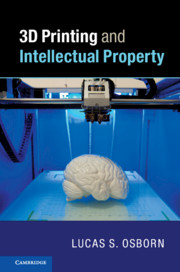Book contents
- 3D Printing and Intellectual Property
- Reviews
- 3D Printing and Intellectual Property
- Copyright page
- Contents
- Acknowledgments
- Abbreviations
- Introduction
- 1 3D Printing Technology’s Capabilities and Effects
- 2 How 3D Printing Works and Why it Matters
- 3 Primer on Intellectual Property Law
- 4 Can You Patent a 3D Printable File? (and Why it Matters)
- 5 Patents – Direct Infringement, Individual Infringement, and “Digital” Infringement
- 6 Patents – Indirect Infringement and Intermediaries
- 7 3D Printing and Trademarks: The Dissociation Between Design and Manufacturing
- 8 Creativity and Utility: 3D Printable Files and the Boundary Between Copyright and Patent Protection
- 9 Design Rights, Tangibility, and Free Expression
- 10 DMFs and Optimizing Innovation Incentives
- Conclusion
- Index
6 - Patents – Indirect Infringement and Intermediaries
Published online by Cambridge University Press: 24 July 2019
- 3D Printing and Intellectual Property
- Reviews
- 3D Printing and Intellectual Property
- Copyright page
- Contents
- Acknowledgments
- Abbreviations
- Introduction
- 1 3D Printing Technology’s Capabilities and Effects
- 2 How 3D Printing Works and Why it Matters
- 3 Primer on Intellectual Property Law
- 4 Can You Patent a 3D Printable File? (and Why it Matters)
- 5 Patents – Direct Infringement, Individual Infringement, and “Digital” Infringement
- 6 Patents – Indirect Infringement and Intermediaries
- 7 3D Printing and Trademarks: The Dissociation Between Design and Manufacturing
- 8 Creativity and Utility: 3D Printable Files and the Boundary Between Copyright and Patent Protection
- 9 Design Rights, Tangibility, and Free Expression
- 10 DMFs and Optimizing Innovation Incentives
- Conclusion
- Index
Summary
Chapter 6 explores the doctrines of indirect (secondary) patent infringement in the United States, Europe, and Japan, focusing primarily on novel statutory interpretation issues brought about by 3D printing technology. Indirect infringement generally requires knowledge of the patent or some sort of intent to infringe. Because 3D printing technology will empower many legally unsophisticated actors to assist – even if unwittingly – others to infringe, virtually every jurisdiction will need to clarify how to measure knowledge or intent when numerous individuals or small businesses are involved. In Europe, courts will also need to decide the fundamental issue of whether the knowledge requirement implies a culpable mental state. Additional statutory interpretation issues include what constitutes a “component” under U.S. law and what constitutes “means, relating to an essential element of the invention” under many countries’ statutes. In Japan, courts or lawmakers will need to clarify whether a “product” includes 3D printable files. The chapter concludes by recommending that courts and lawmakers resolve interpretive issues in a manner that captures at least the most egregious actors, namely, those who repeatedly and knowingly facilitate infringement by distributing DMFs.
Keywords
- Type
- Chapter
- Information
- 3D Printing and Intellectual Property , pp. 104 - 120Publisher: Cambridge University PressPrint publication year: 2019
- 2
- Cited by



